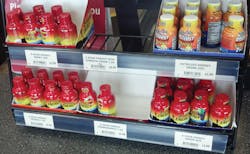I wrote about energy bars in my previous article and was asked to write one about energy drinks. Enjoy.
Walk into any gas station or convenience store and you will find a myriad of products labeled as energy drinks. The coolers contain racks of these so-called supplements, as do the checkout counters. The concept seems sound: drink something to boost your energy whenever you’re feeling tired or in need a quick jolt of energy. But how good are these products? Moreover, how safe are they?
I consulted Kelly Devine-Rickert, www.kellydevinenutrition, a sports dietician and media spokesperson with the Illinois Dietetic Association for some answers. Kelly recommends two of the more popular sports drinks, Gatorade and Powerade, during strenuous exercise lasting at least 30 minutes or longer. These two drinks are particularly important for hydrating in very hot weather because they are designed to replace electrolytes.
However, Kelly points out that these drinks can be easily abused if they become the “go to” drink when not exercising. Gatorade and similar drinks tend to be high in sugar and may cause a person to gain weight due to the extra calories. In hot weather, she advises it’s better to switch between water and an electrolyte drink if you are not engaged in sports or exercise.
For diabetics, or for those watching their weight yet looking for a drink other than water, Crystal Light, Vitamin Water Zero, and G2 are all lower sugar options. These drinks tend to be less than 20 calories per serving, and are lower in sugars than other sweet drinks. Hydrating with low sugar water based drinks is your best bet for raising energy levels and staying hydrated. The high sugar caffeine drinks tend to spike blood sugar, causing a crash one to two hours later.
Products such as Monster, Red Bull, AMP, are all high in sugar, caffeine and B vitamins. These so-called “energy shots,” have gained in popularity the past few years as alternatives to coffee drinks. These drinks have anywhere from 80 mg of caffeine to 280 mg per can. Here’s the downside to these popular products:
- Monster and 5hour energy are currently under investigation by the FDA regarding the safety of their products for general consumption.
- Caffeine is not recommended for pregnant women or those sensitive to caffeine consumed in beverages.
- Caffeine stimulates the central nervous system. It can increase your heart rate, raise your blood pressure and cause irregular heart rhythms.
- Use in moderation! Choose the smallest can, or choose coffee instead which has naturally occurring caffeine.
What’s become problematic is walking into a fast food store looking for a quick solution to low energy and thinking you’ll find the answer in the cooler. The solution is much more complex than drinking a bottle of Gatorade or slugging down a bottle of 5Hour energy. If you are chronically tired, your body is probably telling you that you have a problem. Something needs to be changed—your diet, exercise routine (or lack of same) stress level, or possibly, you aren’t getting enough sleep.
The experts at WebMD suggest the following to boost energy levels naturally:
- Don’t skip meals
- Exercise regularly
- Get enough sleep
- Cut down on sugar and fat
- Quick exercise breaks are better than no exercise
- Reduce stress
I asked Tyler Altenhofen, owner of CompleteNutrition in Fredericksburg, Virginia, what he recommends as an energy supplement, particularly for people who have a strenuous exercise program such as crossfit or triathalon training. “For a healthy alternative to energy drinks found at gas stations, consider a product like Amino Uptake. You mix it yourself and carry it in your own container.” Tyler explained that the product is an amino and energy support supplement that provides the body with the essentials to naturally increase energy, improve focus and support muscle recovery.
Who buys energy drinks? Mostly young males between 12 – 17. They consume an average of 5.2 can per month, whereas adults drink an average of 4.6 cans. Sales for energy shots are through the roof: $4.6 billion per year and growing. Holding more than 75% market share, 5Hour energy leads all energy shot producers, but Red Bull, Monster Energy and Coca-Cola are quickly catching up.
The common ingredient in all these products? Caffeine. Lots of it. The caffeine itself is not the problem. What typically occurs is that people consume energy drinks and shots in addition to coffee and soda. Too much of anything is bad. Energy drinks are no exception. Think about that the next time you run into a 7-11 for a refreshing drink. Water anyone?
Stay Safe, Brothers and Sisters!
About the Author
John Wills
John M. Wills is a former Chicago police officer and retired FBI agent. He is a freelance writer and award-winning author in a variety of genres, including novels, short stories and poetry. John also writes book reviews for the New York Journal of Books, and is a member of the National Book Critics Circle. His new book, The Year Without Christmas, is available now. Visit John at: www.johnmwills.com.

